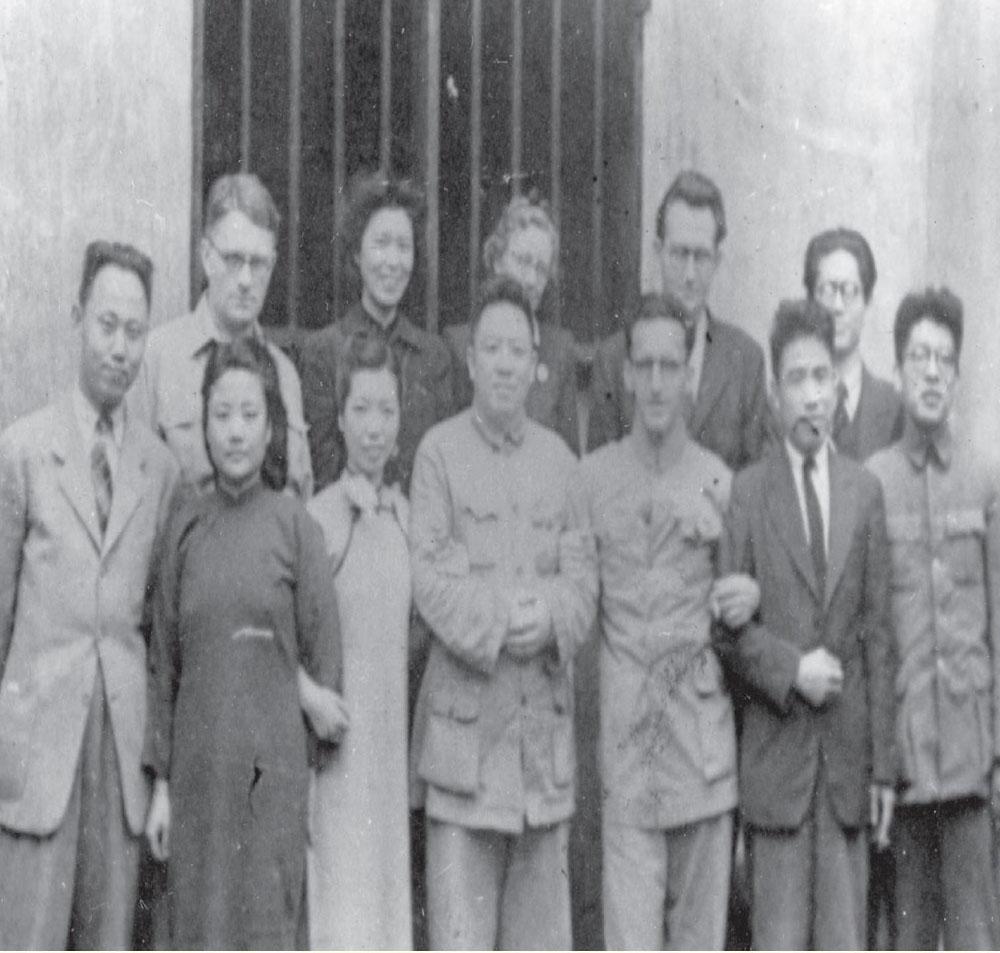中共南方局卓越的外交才能,让世界重新认识中国共产党
2021-09-08



抗戰以前,国民党把中共描绘成堕落、愚昧、无知的土匪,实行共产共妻,只知道烧、杀、抢;抗战后,又四处散播共产党搞割据、游而不击等谣言。然而,中共中央南方局在冲破国民党的重重阻挠,广泛开展外事工作过程中,向国际社会展示了一个充满朝气的民主大党形象和中共领导人卓越的外交才能,让世界重新认识了中国共产党。
著名爱国华侨领袖陈嘉庚曾比较信任国民党,而对共产党有较多思想顾虑,如对中共的民族工商政策、土地政策、民主问题等。在周恩来的努力下,陈嘉庚访问了延安。通过延安之行,陈嘉庚的思想发生了不寻常的飞跃,转而同情中共,并义无反顾地把中国的前途和希望寄托在中国共产党人身上。他回南洋后,不放过一切机会,大加赞扬中共救国救民、廉洁奉公、艰苦奋斗、实事求是、捍卫真理的精神,以及中国共产党人如何上下团结、官兵平等、军民一致,中共领袖如何平易近人、和蔼可亲等。他对儿子陈国庆说:“余此次劳军,经延安所见,深感中国有希望了!”
1944年,中外记者团和美军观察组在访问考察延安后,都大力称赞延安的政治和共产党的政策。美国记者爱泼斯坦深有感触地说:“延安之行可以帮助神圣的反法西斯工作,这个地方很久以来是被封闭着的,这次来到这里把一座关闭了很久的大门打开了一个缝隙,今后谁若再关此门,恐怕是不可能的了。”美军观察组的戴维斯和谢伟思也认为“共产党的政府和军队,是中国近代史中第一次受有积极的广大人民支持的政府和军队,他们得到这种支持,是因为这个政府和军队真正是属于人民的”。
作为中共中央南方局主要领导人,周恩来以“中肯求实、有理有节、求同存异、不卑不亢、平等待人、礼贤尊士”的外交风范和极具感染力的人格魅力,赢得了外国朋友的尊敬、信赖和友谊。英国驻华大使卡尔称:“周恩来是重庆最有智慧的人,周恩来和他代表的政党最终将在中国获胜。”另一位英国驻华大使薛穆也认为周恩来是一个态度温和、能干的外交家,具有完美的个人魅力,从私人角度来讲,值得与他深入交往。1944年3月,薛穆写信给英国外交大臣艾登,认为:“在随着日本的投降而形成的混乱情况下,我个人倾向于支持共产党。”1944年末,薛穆在致艾登的电报中又说:“共产党采取的政治变革的范围和意义非常显著,我的观点倾向于:他们成功的原因只是在于经济问题已经消失,并把这看成是中国的一个巨大成就;边区的领导人是引人注目和强有力的人物。”
时任美国重庆战时新闻处处长费正清后来回忆说:“周恩来的外交魅力在初次见面时就打动了我。在我面前是一位浓眉、英俊的贵胄,却为民众献身;作为个人,他的智慧和敏锐的感觉是罕见的,然而他却致力于集体主义事业。”“居住在周公馆里的共产党人做着一件与美国交往的出色工作,他们以批评的眼光,现实主义的观点同美国人讨论各种问题。虽然他们现在随时有被捕并被投入集中营的危险,但他们仍然本着惊人的团体精神和坚定信仰照旧开展革命工作……在周恩来所住的阁楼里,臭虫也许会从顶棚上掉下来,雨水也许会漏到床上,但他们的宗教热忱和思想信念照旧如火如荼、绝不动摇,仿佛他们自信能够唤醒这个国家。”
不难看出,国际社会各界人士对中国共产党的广泛赞誉,充分展示了以毛泽东、周恩来为代表的中共领导人的独特魅力,他们身上体现了中国共产党的生命力和感召力,同时树立起中共在国际社会良好的政治形象。
1945年10月,毛泽东参加完重庆谈判回到延安后,感慨地说:“我这次在重庆,就深深感到广大人民热烈地支持我们,他们不满意国民党政府,把希望寄托在我们方面。我又看到许多外国人,其中也有美国人,对我们很同情。广大的外国人民不满意中国的反动势力,同情中国人民的力量。他们不赞成蒋介石的政策。我们在全国、全世界有很多朋友,我们不是孤立的。”
毛泽东的这段话,是对周恩来在8年抗战中带领中共中央南方局,在开展党的外交工作中历尽艰险、卓著勋劳的一个最好的总结。(文字资料由中共重庆市委党史研究室提供)
编辑/杨艳
Before the War of Resistance against Japanese Aggression, the Kuomintang (KMT) portrayed the Communist Party of China (CPC) as a corrupt, fatuous and ignorant bandit, who communized property and women and knew nothing but pillaging and plundering; it also spread rumors everywhere about the CPC's separatist regime and its guerilla warfare without regular military combat. After breaking through the numerous obstacles of the KMT and extensively carrying out foreign affairs work, the CPC Southern Bureau, however, showed the international community the image of a vibrant democratic major party and the outstanding diplomatic prowess of the CPC leaders, refreshing the world's understanding of Communist Party of China.
Tan Kah Kee, a famous patriotic overseas Chinese leader, once trusted the KMT and had ideological concerns about the Communist Party, such as its ethnic industrial and commercial policy, land policy, democracy issues and so on. With Zhou Enlai's endeavor, Mr. Tan visited Yan'an. Through his trip to Yan'an, Tan Kah Kee experienced an exceptional ideological leap and identified himself with the CPC and placed China's future and hope on the Chinese communists. After returning to Nanyang, he took every opportunity to praise the spirit of the CPC in saving the country and the people, performing official duties honestly, working hard, seeking truth from facts and defending the truth, as well as how the CPC members unify officers and soldiers, military and civilians, and how approachable and amiable are the CPC leaders. He told his son Tan Kok Kheng, "from what I see in Yan'an, I deeply feel that there's hope for China!"
In 1944, after a visit in Yan'an, Chinese and foreign press corps and the United States Army Observer Group strongly praised the politics and the Communist Party's policies in Yan'an. Israel Epstein, the American journalist said with deep feeling, "the trip to Yan'an helps the sacred anti-fascist work. As this place has been closed for a long time, this trip here has opened a crevice in the long-time closed door. I'm afraid it won't be closed again by anyone in the future." John Paton Davies and John S. Service of the United States Army Observation Group also believe that "the Communist Party's government and army are the first government and army actively supported by the masses in China's modern history, for they really belong to the people".
As the main leader of the CPC Southern Bureau, Zhou Enlai won the respect, trust, and friendship of foreign friends with his diplomatic demeanor and influential charisma of "pertinent and practical-minded, reasonable and disciplined, seeking common ground while reserving differences, being not humble or arrogant, treating people equally and respecting talents and scholars". Sir Archibald Clark-Kerr, the British Ambassador to China, said, "Zhou Enlai is the wisest person in Chongqing. Zhou and the Party he represents will eventually triumph in China." Horace Seymour, another British Ambassador to China, also deemed that Zhou Enlai as a amicable and competent diplomat with perfect charisma. Personally, he is worthy of deep friendship. In March 1944, Horace Seymour wrote to Robert Anthony Eden, the British Foreign Secretary, "in the chaos caused by Japan's surrender, I personally tend to support the Communist Party." In his telegram to Eden at the end of 1944, Horace Seymour also added, "the scope and significance of the political reforms adopted by the Communist Party are very significant. In my opinion, the reason for their success lies in that the economic problems have disappeared, and it is regarded as a huge achievement of China; moreover, the leaders of the border areas are prominent and powerful figures. "
John King Fairbank, then director of the US wartime information office in Chongqing, later recalled, "Zhou Enlai's diplomatic charisma moves me when we first meet. In front of me is a handsome nobleman with thick eyebrows, but dedicates himself to serve the people; as an individual, he oozes one-of-a-kind wisdom and acuity, yet he is committed to the cause of collectivism." "The Communists dwelling in Zhou's Residence has done an excellent job in interacting with the United States. They discuss various issues with the Americans from a critical yet realistic point of view. Despite perils of being arrested and thrown into the concentration camp at any time, they keep doing revolutionary work with incredible team spirit and firm conviction... In the attic where Zhou Enlai used to live, bedbugs might fall from the ceiling and rain may permeate to the bed, but their zeal and belief are still in full swing and would never waver, seeming that they are confident enough to awaken the country. "
It was not hard to tell that the extensive recognition of people from all walks of life in the international community for the Communist Party of China fully manifests the unique charisma of the CPC leaders represented by Mao Zedong and Zhou Enlai, reflecting the vitality and inspiration of the Communist Party of China, and establishing a positive political image of the CPC in the international community.
In October 1945, Mao Zedong returned to Yan'an after the Chongqing Negotiations and said with emotion, "when I was in Chongqing this time, I deeply felt that the masses warmly supported us. They bore a grudge with the KMT government and placed their hopes on us. I also saw many foreigners, including Americans, that empathize with us. The foreign masses loathed China's reactionary forces and empathized with the strength of the Chinese people. They begged to differ from Chiang Kai-shek's policies. We have many friends all over the country and the world. We are not alone."
Mao Zedong's remark serves an optimal summary of Zhou Enlai's arduous yet meritorious journey in carrying out the Party's diplomatic work by leading the CPC Southern Bureau during the eight-year War of Resistance against Japanese Aggression. (Texts/Provided by Party History Research Center of the CPC Chongqing Committee)
Editor/ Yang Yan
